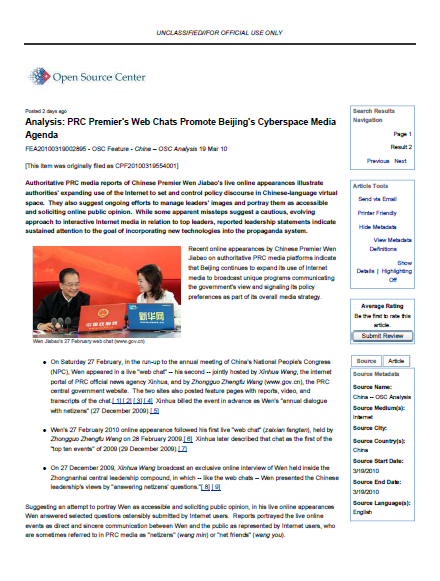 Analysis: PRC Premier’s Web Chats Promote Beijing’s Cyberspace Media Agenda
Analysis: PRC Premier’s Web Chats Promote Beijing’s Cyberspace Media Agenda
- 7 pages
- For Official Use Only
- March 19, 2010
Authoritative PRC media reports of Chinese Premier Wen Jiabao’s live online appearances illustrate authorities’ expanding use of the Internet to set and control policy discourse in Chinese-language virtual space. They also suggest ongoing efforts to manage leaders’ images and portray them as accessible and soliciting online public opinion. While some apparent missteps suggest a cautious, evolving approach to interactive Internet media in relation to top leaders, reported leadership statements indicate sustained attention to the goal of incorporating new technologies into the propaganda system.
Recent online appearances by Chinese Premier Wen Jiabao on authoritative PRC media platforms indicate that Beijing continues to expand its use of Internet media to broadcast unique programs communicating the government’s view and signaling its policy preferences as part of its overall media strategy.
- On Saturday 27 February, in the run-up to the annual meeting of China’s National People’s Congress (NPC), Wen appeared in a live “web chat” — his second — jointly hosted by Xinhua Wang, the internet portal of PRC official news agency Xinhua, and by Zhongguo Zhengfu Wang (www.gov.cn), the PRC central government website. The two sites also posted feature pages with reports, video, and transcripts of the chat. Xinhua billed the event in advance as Wen’s “annual dialogue with netizens” (27 December 2009).
- Wen’s 27 February 2010 online appearance followed his first live “web chat” (zaixian fangtan), held by Zhongguo Zhengfu Wang on 28 February 2009. Xinhua later described that chat as the first of the “top ten events” of 2009 (29 December 2009).
- On 27 December 2009, Xinhua Wang broadcast an exclusive online interview of Wen held inside the Zhongnanhai central leadership compound, in which — like the web chats — Wen presented the Chinese leadership’s views by “answering netizens’ questions.”
Suggesting an attempt to portray Wen as accessible and soliciting public opinion, in his live online appearances Wen answered selected questions ostensibly submitted by Internet users. Reports portrayed the live online events as direct and sincere communication between Wen and the public as represented by Internet users, who are sometimes referred to in PRC media as “netizens” (wang min) or “net friends” (wang you).
- The moderator of Wen’s 27 February web chat claimed to have selected questions from among 190,000 submitted online by Internet users and 70,000 submitted via cell phone instant message (SMS) by users of the joint Xinhua Wang — China Mobile online newspaper, according to the chat transcript (Xinhua Wang). The moderator described “net friends” worldwide as “eagerly looking forward” to “meeting” Wen based on the “deep, positive impression” created by the 2009 web chat, in which Wen was said to have answered Internet users’ questions in a “frank and honest way.”
- Wen and the moderator worked to create personal emotional appeal throughout the chat, starting with the language of Wen’s opening remarks emphasizing his sense of duty to “the people” and his desire to have a sincere “heart-to-heart” exchange (Xinhua Wang). Wen claimed that he “follows the various issues raised by netizens on the Internet very closely.”
- Similarly, a Xinhua report on the February 2009 web chat quoted Wen as saying that the government needs to solicit “questions about governance from the people” (28 February 2009).
- Jiefangjun Bao Online, website of the daily newspaper of the Central Military Commission, touted “zero distance” between netizens and the PRC leadership and described Wen as a “super net friend” in a report on the 2009 web chat (10 March 2009).
